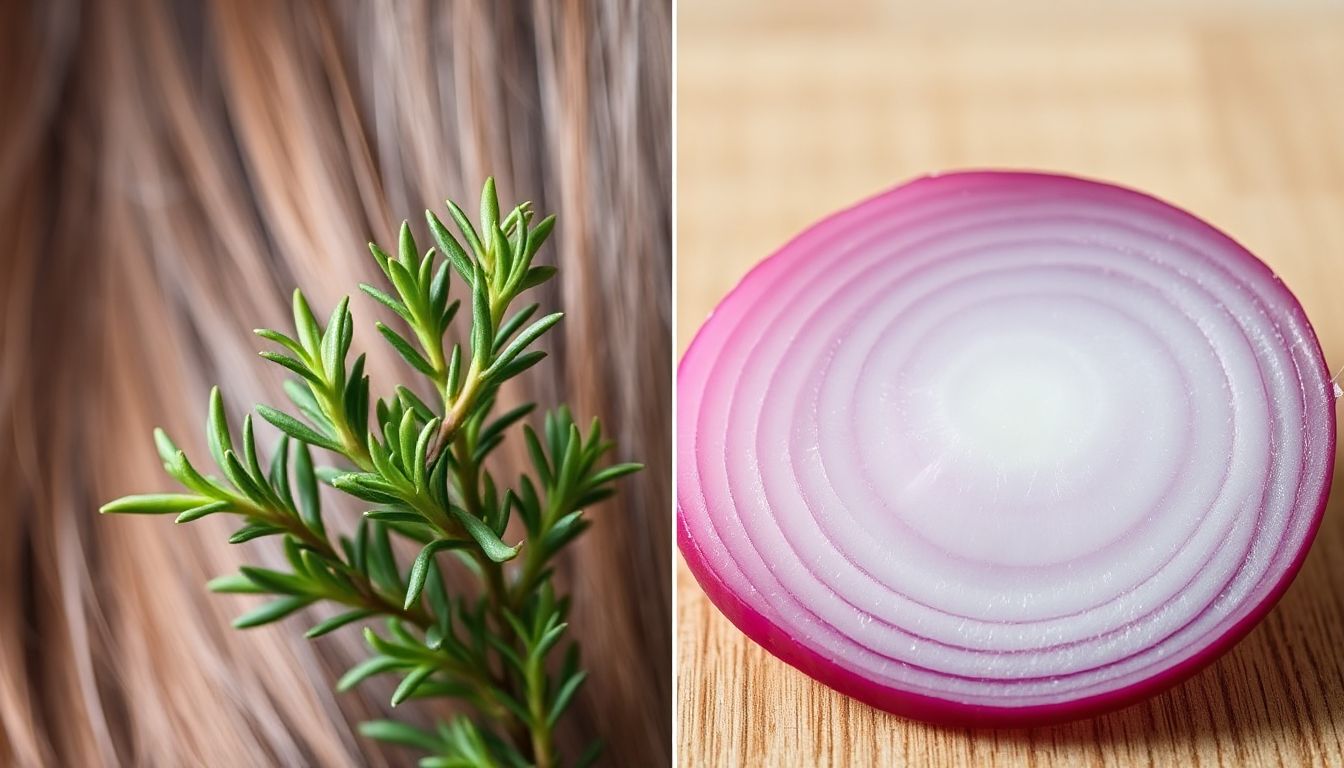
Which Shampoo Regrows Hair Faster? 50% off
Hair thinning and hair loss worry many people. We all want fuller, healthier hair. This constant search for good solutions often leads us to natural remedies. People are looking for gentle, yet effective, ways to boost hair growth.
Among these natural options, rosemary and onion have become very popular. Shampoos with these ingredients are gaining a lot of attention. Many users share stories about how well these products work for hair regrowth. This interest shows a real demand for nature-based hair care.
 This article will compare rosemary and onion shampoos side-by-side. We will look at what the science says about them. We'll also cover their potential benefits for hair regrowth. Our goal is to help you pick the best shampoo for your hair goals.
This article will compare rosemary and onion shampoos side-by-side. We will look at what the science says about them. We'll also cover their potential benefits for hair regrowth. Our goal is to help you pick the best shampoo for your hair goals.
Understanding the Science Behind Hair Regrowth
The Hair Growth Cycle
Hair growth follows three main stages. The first is anagen, the active growth phase. Next comes catagen, a short transition phase. Finally, telogen is the resting and shedding phase. Each phase has its typical length, affecting how much hair we have. When this cycle gets disrupted, hair can thin out.
Common Causes of Hair Loss
Many factors can cause hair to thin or fall out. Your genes play a big role, often seen in male and female pattern baldness. Hormonal shifts, like those during pregnancy or menopause, can also trigger loss. High stress levels, a lack of key nutrients, and scalp problems can also interfere with healthy hair growth. These issues can cut short the hair's growth cycle.
The Potency of Rosemary for Hair Health
Rosemary Oil and Its Hair Benefits
Rosemary oil is well-known for boosting hair growth. It may improve blood flow to the scalp. Better circulation means more nutrients reach hair roots. Rosemary also helps calm scalp inflammation. Its strong antioxidants protect hair follicles from harm.
Scientific Studies on Rosemary for Hair Growth
Research supports rosemary's role in hair health. One notable study compared rosemary oil to minoxidil, a common hair growth treatment. Participants using rosemary oil saw similar hair growth results. This suggests rosemary offers a natural path to thicker hair. Such findings give weight to its use in hair products.
Important Link: Best time to apply hair oil: morning or night?
How Rosemary Shampoo Works
Rosemary in shampoo delivers its benefits directly to your scalp. As you wash, the active compounds touch the skin. This allows for absorption into the hair follicles. The shampoo base also helps spread these helpful ingredients evenly. It creates a better environment for hair to grow.
| DO | DON’T |
|---|---|
| Use 2–3 times per week consistently | Expect overnight results |
| Gently massage into scalp for 2–3 minutes | Leave shampoo on scalp for too long |
| Rinse with lukewarm (not hot) water | Use on broken or irritated skin |
| Do a patch test before full use | Skip patch test (especially with onion) |
| Pair with mild conditioner or natural oils | Combine with chemical-laden shampoos |
| Store in a cool, dry place | Expose to direct sunlight or heat |
| Maintain a healthy diet to support hair health | Rely on shampoo alone for regrowth |
The Power of Onion for Stimulating Hair Growth
Onion Juice and Its Nutritional Profile
Onion juice is packed with good stuff for your hair. It has a high sulfur content, which is key for strong hair. Onions also contain powerful antioxidants. Plus, they offer various vitamins that nourish the scalp. Sulfur, in particular, helps form keratin, the main protein in hair.
Evidence Supporting Onion for Hair Regrowth
Some studies and many user reports back up onion for hair loss. Research into onion juice shows it can help certain types of hair loss. People often share stories of new hair growth after using onion-based remedies. The body of evidence continues to grow. These observations suggest real potential.
Onion Shampoo: Delivering the Benefits
Onion-based shampoos aim to give your scalp the benefits of onion. These products ensure active ingredients reach the hair roots. Shampoo forms allow for even spread and scalp penetration. While onion has a strong smell, many shampoos work to mask it. They still deliver the helpful components without the lingering odor.
Scalp Health and Other Benefits
Anti-Inflammatory and Antioxidant Properties
Rosemary is known for its strong anti-inflammatory effects. It also has potent antioxidants that protect cells. Onion also boasts high antioxidant levels, helping to fight scalp damage. Both ingredients help create a calm, healthy scalp. A healthier scalp is key for robust hair growth.
Impact on Hair Strength and Thickness
Rosemary can make hair feel stronger and reduce breakage. Its properties may lead to less hair fall over time. Onion's sulfur helps build the protein bonds in hair. This can result in visibly thicker hair strands. Both ingredients work towards healthier, more resilient hair.
Potential Side Effects and Sensitivities
While natural, both ingredients can cause reactions. Some people might experience scalp irritation or itchiness. Always do a patch test before full use. Onion shampoos, in particular, can have a strong, lingering smell. This unique aroma is often the biggest hurdle for users.
Factors to Consider When Choosing Your Shampoo
Reading the Ingredient Label
Always check the ingredient list on your shampoo bottle. Look for "Rosmarinus Officinalis Leaf Oil" for rosemary. For onion, seek "Allium Cepa (Onion) Bulb Extract." These names show the pure extracts are present. Ingredients listed higher up mean they are more concentrated in the product.
The Importance of Formulation
The overall shampoo recipe greatly affects how well it works. A good formula supports the active ingredients. It helps them reach the scalp and do their job. Some shampoos include other helpful elements, like vitamins or natural oils. Avoid harsh chemicals that could strip your hair.
Your Specific Hair Loss Concerns
Identifying the Root Cause of Your Hair Loss
Before choosing a shampoo, try to understand why your hair is thinning. Hair loss can stem from many causes. It could be genetic, hormonal, or stress-related. Seeing a dermatologist or trichologist can help you get a clear diagnosis. A correct diagnosis guides you to the best treatment.
Matching Ingredients to Hair Loss Type
For genetic hair loss, rosemary might be a promising choice due to its study data. If your hair loss is linked to nutrient deficiencies, onion's sulfur could be beneficial. Always remember that a shampoo is one part of a bigger plan. Professional advice is best for serious hair loss.
Practical Considerations: Scent, Cost, and Availability
Managing the Scent Profile
Onion shampoos are famous for their distinct smell. While some brands mask it well, a faint odor may remain. Rosemary shampoos, however, typically have a pleasant, herbal scent. If smell is a big concern, rosemary might be a safer bet. Using a strong-smelling conditioner can help mask onion scents.
Cost-Effectiveness of Treatments
The price of rosemary and onion shampoos varies. Some can be quite affordable, others more premium. Consider how often you'll need to buy it. Think of it as an ongoing investment in your hair's health. Long-term use is usually needed for noticeable results.
Where to Find Effective Shampoos
You can find these special shampoos in many places. Online stores offer the widest selection. Specialty beauty shops and some health food stores carry them too. Always buy from a reputable seller to ensure product quality. Check reviews before you buy.
Expert Opinions and Scientific Backing
Professional Recommendations for Natural Hair Growth
Dermatologists and trichologists often see value in natural hair growth aids. They may suggest rosemary or onion as part of a treatment plan. While not miracle cures, these ingredients can support hair health. Experts emphasize that natural options can play a role in overall hair care. They stress the need for a full assessment of hair loss.
When to Seek Professional Help
If your hair loss is sudden, severe, or causes you worry, see a specialist. Shampoos alone may not solve deep-rooted issues. A dermatologist can offer a full diagnosis and recommend proper treatments. Shampoos are often a supportive part of a broader strategy.
The Future of Natural Hair Regrowth Solutions
Emerging Research and Innovations
Research into plant-based hair solutions continues to grow. Scientists are looking at new ways to make these ingredients work even better. We might see more targeted products in the future. The field of natural hair care is always evolving. These innovations promise even more effective options.
Integrating Natural Shampoos into a Hair Care Routine
To get the best results, use these shampoos consistently. Massage the shampoo into your scalp with your fingertips. This helps stimulate blood flow. Pair them with complementary conditioners for added moisture. Make these shampoos a regular part of your hair care for optimal benefits.
Conclusion: Making Your Choice for Thicker Hair
Both rosemary and onion shampoos hold real promise for hair regrowth. Scientific studies and countless user testimonials back their potential. They offer natural, plant-based ways to support healthier, fuller hair.
However, choosing between them comes down to you. What works for one person might not work for another. Your specific hair loss cause, genetics, and how sensitive your scalp is all play a part. An individualized approach is truly crucial for success.
To make your best choice, first understand your hair loss cause. Read product labels carefully, checking for active ingredient quality. Consider talking to a hair professional for expert guidance. Then, pick the shampoo that best fits your hair needs and personal preferences.
The good news is, many effective natural hair care solutions exist today. You have more options than ever to find the right path to thicker, healthier hair.
Frequently Asked Questions (FAQs)
Can I use rosemary and onion shampoo together?
Yes, some people alternate or mix both for enhanced results. Just ensure your scalp tolerates both ingredients well.
How long does it take to see results from rosemary or onion shampoo?
Visible changes often take 8–12 weeks of consistent use, depending on your hair condition and overall care routine.
Does onion shampoo smell bad after washing?
Many onion shampoos today are formulated to reduce or mask odor, though a mild scent may linger. Pairing it with a fragrant conditioner can help.
Is rosemary oil as effective as minoxidil for hair regrowth?
A 2015 study showed rosemary oil had comparable results to minoxidil over 6 months for androgenetic alopecia. It’s a promising natural alternative.
Does onion shampoo help with dandruff and scalp buildup?
Yes. Thanks to its antimicrobial and anti-inflammatory properties, onion shampoo can reduce dandruff and improve scalp health.
Can rosemary shampoo cause scalp irritation?
It's rare, but some users may experience mild irritation or itchiness. Always perform a patch test before regular use.
Which shampoo is best for an oily scalp—rosemary or onion?
Onion shampoo is often better for oily scalps due to its cleansing and antibacterial properties, while rosemary helps balance sebum production.
Do rosemary or onion shampoos thicken hair?
Yes. Rosemary boosts circulation, while onion strengthens keratin bonds—both can lead to visibly thicker, fuller hair over time.

